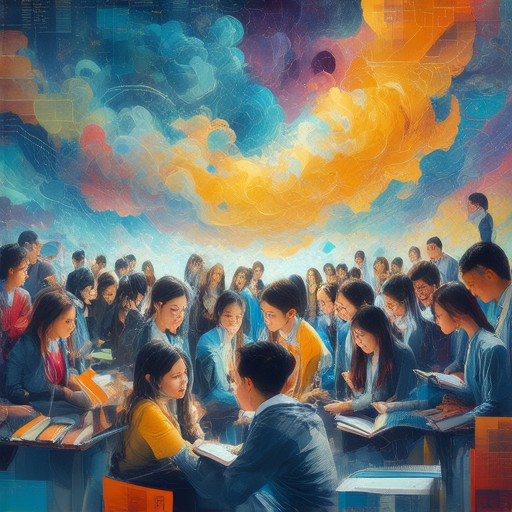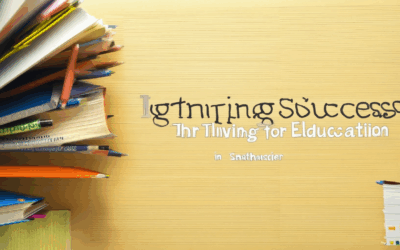Educational advice articles have become an indispensable resource for students navigating the complexities of modern education. In today’s fast-paced learning environment, these articles offer valuable insights into overcoming academic challenges, staying ahead in your studies, and discovering innovative approaches to education. Whether you’re struggling with time management, adapting to new teaching methods, or seeking inspiration from legendary minds like Albert Einstein, there’s a wealth of knowledge waiting to be uncovered. By exploring topics such as current challenges in education, expert tips for success, and the evolution of educational thought, these articles provide a comprehensive guide to excelling in school and beyond. From understanding the latest trends in educational theory to finding reliable sources for research, educational advice articles empower learners to thrive in a dynamic educational landscape.
Key Takeaways
– Educational articles can be referred to as scholarly articles, research articles, peer-reviewed articles, academic journal articles, refereed articles, or scientific articles, depending on their characteristics and context.
– Definite, indefinite, and partitive articles are categories of articles in English that modify nouns, helping clarify the specificity of the referent.
– Academic articles can be accessed through major databases like JSTOR, PubMed, and IEEE Xplore, as well as university libraries, subject-specific directories like ScienceDirect and SpringerLink, and open-access platforms like PLOS ONE and arXiv.
– Google Scholar is a powerful tool for searching academic articles, allowing users to filter results by publication year and peer-reviewed status.
– Research guides and tools, such as those from Cornell University Library, and citation management tools like Mendeley and Zotero, are essential for organizing and discovering related literature.
– Public domain resources like the HathiTrust Digital Library and the Internet Archive provide access to publicly accessible scholarly works.
– Efficiently locating academic articles requires leveraging multiple resources and platforms, ensuring access to a wide range of educational materials.
What Are the Three Biggest Issues in Education Today?
Education faces several significant challenges, with three standing out as particularly pressing concerns:
Funding Shortfalls
Insufficient funding remains one of the most critical issues in education. Schools struggle to afford necessary resources, maintain buildings, and employ qualified staff. Without adequate financial support, many districts are forced to cut programs, increase class sizes, or rely on outdated materials, negatively impacting student outcomes.
Teacher Shortages
There is a persistent shortage of qualified teachers across the country. Factors such as competitive salaries, challenging working conditions, and retirement rates contribute to this problem. Schools often face difficulty finding experienced educators, leading to larger class sizes and reliance on substitutes, which can harm the quality of education.
Technology Integration
Modernizing schools with technology is another major challenge. Not all students have access to the tools needed for 21st-century learning, creating disparities in educational opportunities. Additionally, teachers may lack sufficient training to effectively integrate technology into their curricula, potentially limiting its benefits.
These issues require immediate attention to ensure equitable access to quality education for all students. To learn more about how to address these challenges, visit Enroll Maven .
Best Advice for Students
As a student, staying focused, motivated, and organized is crucial to your academic success. Here are some key pieces of advice to help you navigate your educational journey effectively:
- Stay Focused and Motivated
- Set clear goals and stay committed to your aspirations.
- Develop a strong work ethic and discipline in your studies.
- Surround yourself with supportive friends or study groups to stay motivated.
- Develop Good Habits
- Establish a consistent study schedule and stick to it.
- Utilize effective time management techniques to balance your responsibilities.
- Take care of your physical and mental health to maintain peak performance.
- Leverage Available Resources
- Make full use of library resources, online databases, and academic tools.
- Join study groups or clubs to enhance your learning experience.
- Seek out mentorship opportunities to gain valuable insights and guidance.
- Seek Support When Needed
- Don’t hesitate to ask for help from teachers, mentors, or peers when you’re struggling.
- Consider counseling services if you’re facing personal challenges that affect your studies.
- Reach out to classmates or join study groups for collaborative learning.
- Plan for Your Future
- Start preparing for your career early and explore internships or volunteer opportunities.
- Stay informed about admission requirements and application processes for your desired programs.
- Build a strong network of professionals in your field of interest to gain insights and opportunities.
Remember, consistency and perseverance are key to long-term success. By adopting these strategies, you can maximize your potential and achieve your educational goals. Visit Enroll Maven for more tips and resources to support your academic journey.
Albert Einstein’s Views on Education
Albert Einstein, the renowned physicist, had profound insights into the nature of education. His quotes and ideas continue to resonate deeply in the field of learning:
The Purpose of Education
Einstein believed that education should aim to develop independent thinkers rather than mere repositories of facts. He often quoted, “Education is not the filling of a pail, but the lighting of a fire.” This metaphor captures his vision of education as a catalyst for intellectual growth and curiosity.
Critical Thinking and Creativity
Einstein emphasized the importance of fostering critical thinking and creativity in education. He saw it as a means to unlock human potential and drive innovation. “Imagination is more important than knowledge,” he once said, highlighting the value of creative thinking in solving complex problems.
Distinguishing Education from Fact-Memorization
Einstein distinguished education from simple memorization. He viewed it as a process of developing the mind’s ability to think critically and independently. “The true purpose of education is to replace an empty mind with an open one,” he noted, advocating for a dynamic and enquiring approach to learning.
Curiosity and Exploration
Einstein believed that education should inspire curiosity and a love for exploration. He saw learning as a journey of discovery, where questions lead to new answers and fuel further inquiry. This mindset aligns with his own approach to scientific exploration.
The Role of Teachers
In Einstein’s view, teachers should act as guides rather than mere transmitters of information. They should nurture students’ natural curiosity and provide the tools for self-directed learning. This collaborative relationship between teacher and student is essential for fostering a deeper understanding of complex concepts.
Legacy of Einstein’s Educational Ideas
Einstein’s ideas about education remain influential today. They continue to inspire educational reforms that prioritize critical thinking, creativity, and the development of independent thinkers. His legacy challenges us to rethink how we approach learning and teaching in the modern world.
What Are Educational Articles Called?
Scholarly articles are often referred to by various names depending on their specific characteristics and context. Here are some commonly used terms:
- Scholarly Articles : These are typically found in academic journals and have undergone a peer-review process.
- Research Articles : These present original research findings and are often written by experts in their field.
- Peer-Reviewed Articles : These go through an evaluation process by other experts in the field, ensuring credibility.
- Academic Journal Articles : Published in academic journals, they are known for their rigorous standards and original contributions.
- Refereed Articles : Similar to peer-reviewed, this term highlights the evaluation process conducted by referees.
- Scientific Articles : Often part of scientific research, these are published in scientific journals.
- Professional Articles : Used in specific professional contexts outside of academia.
The three primary types of articles in English are definite, indefinite, and partitive articles. These articles modify nouns or noun phrases and help clarify the specificity of the referent.
- Definite Article: Used before a specific noun or noun phrase whose identity is known. Example: “the dog” or “the apple.”
- Indefinite Article: Used before a noun or noun phrase that is not uniquely identifiable. Examples: “a cat” or “an orange” (used before vowels).
- Partitive Article: Indicates a portion or quantity of something. Examples: “some milk” or “any juice left.”
How Can I Find Academic Articles?
To locate academic articles efficiently, follow these organized methods:
- A. Academic Databases and Journals
- Search major academic databases like JSTOR , PubMed , and IEEE Xplore . These platforms offer extensive collections of peer-reviewed articles.
- Explore university library databases such as Caltech Library or your institution’s virtual library portal.
- Use subject-specific directories like ScienceDirect for science, technology, and mathematics or SpringerLink for humanities and social sciences.
- B. University and Public Libraries
- Your institution’s library website often provides access to thousands of academic journals through subscriptions. Utilize services like ProQuest for interdisciplinary research.
- Public libraries may offer access to research databases via partnerships with organizations like CRL (Center for Research Libraries) .
- C. Open Access Platforms
- Access free versions of many academic papers on platforms like PLOS ONE , arXiv (for preprints), and bioRxiv .
- Check Unpaywall to find open-access versions of paid articles.
- D. Google Scholar
- Use Google Scholar to search for specific topics. Apply filters like publication year and peer-reviewed only.
- Combine search terms with quotes, e.g., “COVID-19 impact” to get precise results.
- E. Research Guides and Tools
- Consult Cornell University Library’s Research Guides for tailored resources.
- Utilize citation management tools like Mendeley or Zotero to organize and discover related literature.
- F. Public Domain Resources
- Visit HathiTrust Digital Library for publicly accessible books and articles.
- Explore The Internet Archive for digitized scholarly works.
Conclusion: By leveraging these resources, you can efficiently locate and access a wide range of academic articles. Whether through institutional libraries, specialized databases, or open-access platforms, there are numerous avenues to discover the knowledge you seek. Explore these options to find the most suitable resources for your research needs.









0 Comments